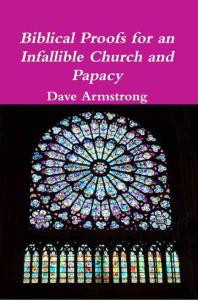“Please Hit ‘Subscribe’”! If you have received benefit from this or any of my other 4,600+ articles, please follow this blog by signing up (with your email address) on the sidebar to the right (you may have to scroll down a bit), above where there is an icon bar, “Sign Me Up!”: to receive notice when I post a new blog article. This is the equivalent of subscribing to a YouTube channel. Please also consider following me on Twitter / X and purchasing one or more of my 55 books. All of this helps me get more exposure, and (however little!) more income for my full-time apologetics work. Thanks so much and happy reading!
***
I am responding to the book, Plain Reasons Against Joining the Church of Rome (London: Society for Promoting Christian Knowledge, 1880), by Richard Frederick Littledale (1833-1890), an Anglo-Irish clergyman and prolific author. He received LL.B. and LL.D. degrees from Trinity College Dublin, in 1862, and a D.C.L. from Oxford. He was renowned as a father confessor, and next to Edward Pusey is said to have heard more confessions than any other priest of the church of England. His Plain Reasons Against Joining the Church of Rome, a volume of which thirty-six thousand copies were issued in 1880 and following years, evoked replies from the Rev. W. Horsfall, the Rev. A. Mills, Oxoniensis, and H. I. D. Ryder. I’ll be addressing his argument against the infallibility of the Church. His words will be in blue.
***
there is in Scripture no promise of infallibility to the Church at any given time. (p. 148; his italics)
Acts 15:28-29 (RSV) For it has seemed good to the Holy Spirit and to us to lay upon you no greater burden than these necessary things: [29] that you abstain from what has been sacrificed to idols and from blood and from what is strangled and from unchastity. If you keep yourselves from these, you will do well. Farewell.
This has to do with the Jerusalem Council, which was a meeting of apostles and elders in the Church, including Peter, Paul, James, and Barnabas (Acts 15:2, 4, 6, 22-23; 16:4). If the Holy Spirit agreed with it (as He did), it’s infallible, and, I contend, also inspired. And it is that whether it eventually wound up in Scripture or not (just as Jesus’ or [no doubt many of] Paul’s words that didn’t make it to the Bible also were, in and of themselves). When the decree was made, the ones who made it didn’t know that it was to become part of Scripture. It doesn’t follow that it wasn’t what it was, or that it didn’t have the authority that it did.
The fact that the dealings and decree of the council are in the Bible actually makes my argument stronger, because now we have the assurance that the recorded words can be absolutely trusted as accurate, since they’re in the inspired revelation of Scripture. Therefore, an infallible decree was made (it couldn’t be otherwise, with the Holy Spirit involved, and Luke couldn’t have falsely recorded this, in his inspired words) by an official council of the Church, with its greatest leaders of the time, and it was promulgated throughout Asia Minor (Turkey) as binding by the Apostle Paul (Acts 16:4). This state of affairs utterly contradicts sola Scriptura, since that false doctrine claims that there can be no such thing as an infallible Church council and that only the Bible is an infallible authority.
If all that doesn’t demonstrate infallibility and an infallible Church, I don’t know what conceivable thing does. It couldn’t be more clear than it is. And it couldn’t be more contradictory to sola Scriptura than it is. The second biblical argument in this regard is equally decisive and unanswerable:
1 Timothy 3:15 . . . the household of God, which is the church of the living God, the pillar and bulwark of the truth.
Remember, this is inspired Scripture, and it has a great significance, since it is a description of an essential characteristic of the Church by the great Apostle Paul. He was making a general statement about the nature of the Church and proclaiming that the Church is central in the matter of ascertaining and determining truth in theological and spiritual matters.
Pillars and foundations support things and prevent them from collapsing. To be a “bulwark” of the truth, means to be a “safety net” against truth turning into falsity. If the Church could err, it could not be what Scripture says it is. God’s truth would be the house built on a foundation of sand in Jesus’ parable. For this passage of Scripture to be true, the Church could not err — it must be infallible. A similar passage may cast further light on 1 Timothy 3:15:
Ephesians 2:19-21 . . . you are fellow citizens with the saints and members of the household of God, [20] built upon the foundation of the apostles and prophets, Christ Jesus himself being the cornerstone, [21] in whom the whole structure is joined together and grows into a holy temple in the Lord;
1 Timothy 3:15 defines “household of God” as “the church of the living God.” Therefore, we know that Ephesians 2:19-21 is also referring to the Church, even though that word is not present. Here the Church’s own “foundation” is “the apostles and prophets, Christ Jesus himself being the cornerstone.” The foundation of the Church itself is Jesus and apostles and prophets.
Prophets spoke “in the name of the Lord” (1 Chron 21:19; 2 Chron 33:18; Jer 26:9), and commonly introduced their utterances with “thus says the Lord” (Is 10:24; Jer 4:3; 26:4; Ezek 13:8; Amos 3:11-12; and many more). They spoke the “word of the Lord” (Is 1:10; 38:4; Jer 1:2; 13:3, 8; 14:1; Ezek 13:1-2; Hos 1:1; Joel 1:1; Jon 1:1; Mic 1:1, et cetera). These communications cannot contain any untruths insofar as they truly originate from God, with the prophet serving as a spokesman or intermediary of God (Jer 2:2; 26:8; Ezek 11:5; Zech 1:6; and many more). Likewise, apostles proclaimed truth unmixed with error (1 Cor 2:7-13; 1 Tim 2:7; 2 Tim 1:11-14; 2 Pet 1:12-21).
Does this foundation have any faults or cracks? Since Jesus is the cornerstone, he can hardly be a faulty foundation. Neither can the apostles or prophets err when teaching the inspired gospel message or proclaiming God’s word. In the way that apostles and prophets are infallible, so is the Church set up by our Lord Jesus Christ. We ourselves (all Christians) are incorporated into the Church (following the metaphor), on top of the foundation.
1 Peter 2:4-9 Come to him, to that living stone, rejected by men but in God’s sight chosen and precious; [5] and like living stones be yourselves built into a spiritual house, to be a holy priesthood, to offer spiritual sacrifices acceptable to God through Jesus Christ. [6] For it stands in scripture: “Behold, I am laying in Zion a stone, a cornerstone chosen and precious, and he who believes in him will not be put to shame.” [7] To you therefore who believe, he is precious, but for those who do not believe, “The very stone which the builders rejected has become the head of the corner,” [8] and “A stone that will make men stumble, a rock that will make them fall”; for they stumble because they disobey the word, as they were destined to do. [9] But you are a chosen race, a royal priesthood, a holy nation, God’s own people, that you may declare the wonderful deeds of him who called you out of darkness into his marvelous light. (cf. Isa 28:16)
Jesus is without fault or untruth, and he is the cornerstone of the Church. The Church is also more than once even identified with Jesus himself, by being called his “Body” (Acts 9:5 cf. with 22:4 and 26:11; 1 Cor 12:27; Eph 1:22-23; 4:12; 5:23, 30; Col 1:24). That the Church is so intimately connected with Jesus, who is infallible, is itself a strong argument that the Church is also infallible and without error.
Therefore, the Church is built on the foundation of Jesus (perfect in all knowledge), and the prophets and apostles (who spoke infallible truth, often recorded in inspired, infallible Scripture). Moreover, it is the very “Body of Christ.” It stands to reason that the Church herself is infallible, by the same token. In the Bible, nowhere is truth presented as anything less than pure truth, unmixed with error. That was certainly how Paul conceived his own “tradition” that he received and passed down.
Knowing what truth is, how can its own foundation or pillar be something less than total truth (since truth itself contains no falsehoods, untruths, lies, or errors)? It cannot. It is impossible. It is a straightforward matter of logic and plain observation. A stream cannot rise above its source. What is built upon a foundation cannot be greater than the foundation. If it were, the whole structure would collapse.
If an elephant stood on the shoulders of a man as its foundation, that foundation would collapse. The base of a skyscraper has to hold the weight above it. The foundations of a suspension bridge over a river have to be strong enough to support that bridge.
Therefore, we must conclude that if the Church is the foundation of truth, the Church must be infallible, since truth is infallible, and the foundation cannot be lesser than that which is built upon it. And since there is another infallible authority apart from Scripture, sola scriptura must be false.
The Roman argument, that if God have given a revelation at all to men, He must also have provided an authority on earth which shall infallibly interpret its meaning so as to avoid all error, is one of those examples of man’s attempting to dictate what God ought to do; not an account of what God has done. (p. 149)
Nonsense. God the Holy Spirit did do this by ensuring that the results of the Jerusalem Council were infallible. It’s right in Scripture. We know it happened because infallible, inerrant, inspired revelation told us so. First God communicated with St. Peter in a dream, about clean foods and the Gentiles, then it was institutionally and historically enshrined in the decrees of the council of apostles and elders, with the express consent of God the Holy Spirit. That’s authority! After the apostles died out (basically the end of the first century), the elders continued the same process in ecumenical councils.
Dr. Littledale himself noted that “What is promised is, that the Holy Spirit will guide us into all truth (St. John xvi. 13)” (p. 148). Indeed, this is the case, and Acts 15:28 and the Jerusalem Council provide a literal, concrete example of that very thing happening: the Holy Spirit guiding an authoritative council of the early Church, that issued binding decrees (via St. Paul and Barnabas and others) to Christians far and wide. And God had directly guided Peter in a related vision (Acts 10:9-20) too. Sound familiar? Only one Church keeps doing that today, as it always has, following this inspired biblical model.
God also inspired Paul to proclaim that the Church was “the pillar and bulwark of the truth.” This is the same thing as what Dr. Littledale calls “an authority on earth which shall infallibly interpret.” It does exist, and the Bible says so. Would that Dr. Littledale had read his Bible more closely, instead of picking and choosing what he likes and ignoring or discarding or irresponsibly misinterpreting what doesn’t conform to the many false man-made traditions of Protestantism. We’re not left as orphans (“I will not leave you desolate; I will come to you”: Jn 14:18).
One very plain disproof of the Roman a priori argument is, that God gave a revelation to the Jews fifteen hundred years before Christ, but no one pretends that they ever had an infallible living voice to keep them from all error regarding the law of Moses. (p. 150)
Actually they did have infallible guides — even arguably inspired ones (many of their words having been recorded in Holy Scripture) — : the prophets. A biblical argument can be made, as well, for the indefectibility of the Old Testament proto-church.
*
***
*
Practical Matters: Perhaps some of my 4,600+ free online articles (the most comprehensive “one-stop” Catholic apologetics site) or fifty-five books have helped you (by God’s grace) to decide to become Catholic or to return to the Church, or better understand some doctrines and why we believe them.
Or you may believe my work is worthy to support for the purpose of apologetics and evangelism in general. If so, please seriously consider a much-needed financial contribution. I’m always in need of more funds: especially monthly support. “The laborer is worthy of his wages” (1 Tim 5:18, NKJV). 1 December 2021 was my 20th anniversary as a full-time Catholic apologist, and February 2022 marked the 25th anniversary of my blog.
PayPal donations are the easiest: just send to my email address: [email protected]. Here’s also a second page to get to PayPal. You’ll see the term “Catholic Used Book Service”, which is my old side-business. To learn about the different methods of contributing (including Zelle), see my page: About Catholic Apologist Dave Armstrong / Donation Information. Thanks a million from the bottom of my heart!
*
***
*
***
Photo credit: cover of my book, Biblical Proofs for an Infallible Church and Papacy (March 2012, 150 pages). See book info, and purchase options at the link to the left.
Summary: Anglican polemicist Richard Frederick Littledale (1833-1890) made a dubious claim about no [?] biblical data for an infallible Church. I refute it from the Bible.













